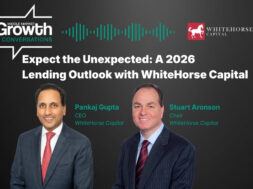Dealmaking in the Year Ahead
Deal activity at the end of 2022 pointed to an expected slowdown, as investors focused on bright spots and took longer to scrutinize companies

Our Middle Market Multiples report published in December offered data and perspectives from sources pointing to slower deal activity in 2023 because of worsening market conditions.
The last quarter of 2022 already showed some of that expected slowdown—with sponsors seeing less deal flow from banks, lenders being increasingly cautious about which loans they take on, auctions taking longer to close and companies being more meticulous about getting their house in order before going to market.
This section of the report originally appeared in the Winter 2023 issue of Middle Market DealMaker. Read the full story in the archive.
Although year-end data wasn’t yet available at the time of writing, several investors and advisors say the end of the year showed less activity than usual. How bad things are getting depends on who you talk to. Investment bankers are often optimistic about deal flow because M&A is their bread and butter, while private equity firms are being selective and mostly focusing on add-ons. Lenders are especially cautious in this environment to avoid deals that could result in defaults.
“Bankers tend to focus on continued market strength while private equity is talking about a readjustment on pricing,” says Bob Goldsmith, founder and president at Northern Edge Advisors, a New York-based lower middle-market investment bank.
Still, several mid-market firms announced deals in December. Wind Point Partners’ Smart Care bought refrigeration company Refrigeration Anytime, while Cornell Capital’s Ingenovis Health acquired Springboard Healthcare, a healthcare staffing business. Gryphon Investors-backed Right Time also bought a Canadian HVAC business, Dunn Heating and Air Conditioning, in December.
Related content: No Uncertain Terms: Shifts in Key Deal Terms Ahead
Many firms transacting today are sticking to the sectors they know best, companies that might be more resilient in a downturn and, increasingly, smaller deals and add-ons.
“We were funding a few deals at year-end, but it’s less than we thought we would, as a slowing economy and higher financing costs took hold,” says Art Penn, founder at private credit firm PennantPark. “We’re in the careful and cautious camp—not putting it all into the market right now. This environment is going to last a while, so it necessitates careful deployment.”
Buyer and Seller Motivations
Bankers noted that owners of smaller, founder-run companies might still be motivated to sell, especially if they’ve been through several bear markets.
“Just because they can’t get the highest price, doesn’t mean they won’t sell. This is about individual people’s lives and needs. Some people need to retire. There are different drivers than in the public market,” Goldsmith says.
“There are a lot of founders who have been through a number of recessions and events who don’t want to go through another one,” agrees Stephen Rossi, managing director and co-founder of investment banking services at Palm Tree, who oversees the firm’s middle-market investment banking arm out of Los Angeles.
From the buyer perspective, private equity firms are scrutinizing deals. “They want to have more visibility on how the company will perform in a downturn,” says Goldsmith. “Lenders also want your numbers lined up. The info has to be readily available, sometimes on a monthly basis as opposed to quarterly.”
Extending the timeline for launching and running an auction could prove to be a smart strategy in this environment, sources say. Companies have more time to do quality of earnings work and can show a longer period of performance through a recession.
Palm Tree’s Rossi says he hasn’t seen as much of a slowdown in middle-market M&A, but there is a huge gap from one term sheet to another and deals are taking longer to close. “It’s taking longer to find the right partner at the best terms and price,” he says.
Related content: Fundraising Trends and Value-Creation Focus Weigh on Private Equity Hiring
Several sources noted that while 2021 was very busy and many firms were rushing to get deals closed at the end of the year, the slower pace at the end of 2022 could be a welcome change. Bankers said in 2021 that they were telling some companies to wait to launch until 2022, so they would have more time to put materials together.
The mindset at the end of 2022 was a bit different than the year prior, with fewer deals in the market, ample time for prep work and more opportunity to get everything in order before launching a process. “In 2021, there was a blizzard. Last year, from the third quarter through the end of the year, it’s been kind of moderate, a lot of add-on acquisitions,” says PennantPark’s Penn.
Some companies are waiting on the sidelines for market conditions to improve, but Palm Tree wants to launch sooner, before market conditions worsen. “We’re in a recessionary and inflationary environment, and those concerns will continue to be a drag on availability and cost of leverage, and valuations,” Rossi says. But he’d rather start the auction process. Most transactions take six to nine months to close nowadays. That gives investors a longer time frame to get comfortable with a company and its performance through a macro downturn.
[PE firms] want to have more visibility on how the company will perform in a downturn. Lenders also want your numbers lined up. The info has to be readily available, sometimes on a monthly basis as opposed to quarterly.
Bob Goldsmith
Northern Edge Advisors
Sector Trends
PennantPark is continuing to focus on its core sectors, especially defense and government services that could see more activity from the new defense spending bill that will raise salaries for service members and authorize military aid for Ukraine and Taiwan. Home maintenance and healthcare will continue to be strong, Penn says, while he’s more cautious about the consumer sector.
Palm Tree’s Rossi cites healthcare, technology and business services as areas with strong tailwinds. “Those sectors tend to be where the flight to quality is going. Some areas of concern are companies related to consumer buying trends or those with large international supply chains, especially from Asia,” Rossi says.
Despite the negativity toward consumer deals in this market, investors are still cherry-picking companies in the sector. Palm Tree closed a consumer services deal right before Christmas. “It was a great company with good cash flow, and we were able to get past investors’ knee-jerk concerns around the consumer industry,” says Rossi about the company, which he couldn’t yet name. “The particular sectors where this business plays tend to be recession-resistant, but there were a lot of groups that said, ‘Because it’s consumer, I just can’t touch it right now.’”
New Water Capital also didn’t shy away from the consumer sector. The Boca Raton, Florida-based private equity firm invested last year in Klosterman Baking, a Cincinnati-based bakery that makes a variety of breads, donuts and other products. The company is a fourth-generation family business, whose owners wanted to cash out, says Jason Neimark, managing partner at New Water Capital. “The company needed to bolster its systems and processes and improve its management bench,” he adds. New Water Capital stepped in with those services and brought in a new CEO previously with Custom Made Meals, a food business that New Water Capital used to own. “It’s consumer nondiscretionary, recession-resistant and had good growth but also operational challenges that can be tackled,” Neimark says.
New Water focuses on special situations, deep value investing, carveouts, transitions and turnarounds: areas where the firm still sees a lot of opportunity, especially now. In the lower middle market, the firm often looks at small businesses that don’t have sophisticated processes or systems in place and could use an operational upgrade that an investor can bring to the table. “Sometimes they’re just run by the family checkbook,” Neimark says.
In December, New Water’s portfolio company LUXIT Group acquired a lighting manufacturing facility in Tennessee from Proper Group International. “The facility adds multicolor injection molding, anti-fog, and hard coating and assembly capabilities in a strategic location close to many of LUXIT’s customers,” a press release from the firm said. The asset was sold out of a large restructuring situation where the sale helped Proper Group’s lenders get the most value, says Neimark. Going forward, New Water is focusing on the OEM auto space, industrial technology and other manufacturing and consumer businesses.
“We have a saying that you can fix a bad business, but you can’t fix a bad industry,” Neimark says, so the firm targets areas where it believes fundamentals are still sound, despite market headwinds,
Anastasia Donde is Middle Market Growth’s senior editor.


